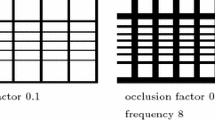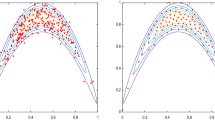Abstract
We propose a mathematical expression for the optimal distribution of the number of samples in multiple importance sampling (MIS) and also give heuristics that work well in practice. The MIS balance heuristic is based on weighting several sampling techniques into a single estimator, and it is equal to Monte Carlo integration using a mixture of distributions. The MIS balance heuristic has been used since its invention almost exclusively with an equal number of samples from each technique. We introduce the sampling costs and adapt the formulae to work well with them. We also show the relationship between the MIS balance heuristic and the linear combination of these techniques, and that MIS balance heuristic minimum variance is always less or equal than the minimum variance of the independent techniques. Finally, we give one-dimensional and two-dimensional function examples, including an environment map illumination computation with occlusion.




Similar content being viewed by others
References
Bekaert, P., Sbert, M., Halton, J.: Accelerating path tracing by re-using paths. In: Proceedings of EGRW ’02, pp. 125–134. Eurographics Association, Switzerland (2002)
Bullen, P.: Handbook of Means and Their Inequalities. Springer Science+Business Media, Dordrecht (2003)
Cornuet, J.M., Marin, J.M., Mira, A., Robert, C.P.: Adaptive multiple importance sampling. Scand. J. Stat. 39(4), 798–812 (2012)
Csonka, F., Szirmay-Kalos, L., Antal, G.: Cost-driven multiple importance sampling for Monte-Carlo rendering. TR-186-2-01-19, Institute of Computer Graphics and Algorithms, Vienna University of Technology (2001)
Douc, R., Guillin, A., Marin, J.M., Robert, C.P.: Convergence of adaptive mixtures of importance sampling schemes. Ann. Stat. 35(1), 420–448 (2007)
Douc, R., Guillin, A., Marin, J.M., Robert, C.P.: Minimum variance importance sampling via population Monte Carlo. ESAIM Probab. Stat. 11, 427–447 (2007)
Elvira, V., Martino, L., Luengo, D., Corander, J.: A Gradient adaptive population importance sampler. In: Proceedings of ICASSP 2015, pp. 4075–4079. IEEE (2015)
Graybillk, F.A., Deal, R.: Combining unbiased estimators. Biometrics 15, 543–550 (1959)
Hachisuka, T., Kaplanyan, A.S., Dachsbacher, C.: Multiplexed metropolis light transport. ACM Trans. Graph. 33(4), 100:1–100:10 (2014)
Hardy, G., Littlewood, J., Pólya, G.: Inequalities. Cambridge Mathematical Library. Cambridge University Press, Cambridge (1952)
Havran, V., Sbert, M.: Optimal combination of techniques in multiple importance sampling. In: Proceedings of the 13th ACM SIGGRAPH International Conference on Virtual-Reality Continuum and Its Applications in Industry. VRCAI ’14, pp. 141–150. ACM, New York (2014)
Kalos, M., Whitlock, P.: Monte Carlo Methods: Basics. Monte Carlo Methods. Wiley, New York (1986)
Korovkin, P.P.: Inequalities. Little Mathematics Library. Mir Publishers, Moscow (1975)
Lafortune, E.P., Willems, Y.D.: Using the Modified Phong Reflectance Model for Physically Based Rendering. TR CW197, Department of Computers, K.U. Leuven (1994)
Lai, Y.C., Chou, H.T., Chen, K.W., Fan, S.: Robust and efficient adaptive direct lighting estimation. Vis. Comput. 31(1), 83–91 (2014)
Lu, H., Pacanowski, R., Granier, X.: Second-order approximation for variance reduction in multiple importance sampling. Comput. Graph. Forum 32(7), 131–136 (2013)
Marin, J.M., Pudlo, P., Sedki, M.: Consistency of the adaptive multiple importance sampling. Preprint arXiv:1211.2548 (2012)
Owen, A., Zhou, Y.: Safe and effective importance sampling. J. Am. Stat. Assoc. 95, 135–143 (2000)
Rubinstein, R., Kroese, D.: Simulation and the Monte Carlo Method. Wiley Series in Probability and Statistics. Wiley, New York (2008)
Sbert, M., Havran, V., Szirmay-Kalos, L.: Variance analysis of multi-sample and one-sample multiple importance sampling. Comput. Graph. Forum 35(7), 451–460 (2016)
Tokuyoshi, Y., Ogaki, S., Sebastian, S.: Final Gathering Using Adaptive Multiple Importance Sampling. In: ACM SIGGRAPH ASIA 2010 Posters, SA ’10, pp. 47:1–47:1. ACM, New York, USA (2010)
Veach, E.: Robust Monte Carlo methods for light transport simulation. Ph.D. thesis, Stanford University (1997)
Veach, E., Guibas, L.J.: Optimally combining sampling techniques for Monte Carlo rendering. In: Proceedings of SIGGRAPH ’95, pp. 419–428. ACM, New York (1995)
Acknowledgements
This work has been partially funded by Czech Science Foundation research program GA14-19213S and by Grant TIN2016-75866-C3-3-R from the Spanish Government.
Author information
Authors and Affiliations
Corresponding author
Electronic supplementary material
Below is the link to the electronic supplementary material.
Rights and permissions
About this article
Cite this article
Sbert, M., Havran, V. Adaptive multiple importance sampling for general functions. Vis Comput 33, 845–855 (2017). https://doi.org/10.1007/s00371-017-1398-1
Published:
Issue Date:
DOI: https://doi.org/10.1007/s00371-017-1398-1




